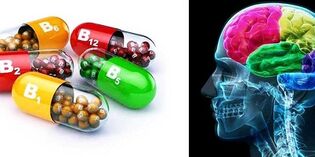
The human brain is an incredibly complex device in our body. The center of the nervous system consumes up to 25% of total energy consumption, while weighing up to two percent of total body weight. In order to have complete and uninterrupted brain activity, the supply of carbohydrates, proteins and polyunsaturated fatty acids must be ensured. Food should contain amino acids, minerals and vitamins for the brain and memory.
Brain Connections
Let's start with an overview of the vitamins that are essential for the central nervous system of group B. The following factors combine them:
- contain nitrogen;
- are considered water soluble;
- has a similar effect on the body;
- are often found together in the same products;
Initially, after the discovery, scientists thought they were dealing with only one vitamin, and only over time did they realize that they were different compounds with similar properties. There are 7 basic B vitamins:
- B1 or thiamine- necessary for a clear mind and strong memory. It also reduces fatigue as it is involved in almost all of the body’s metabolic processes involving energy production.
- B2 or riboflavin- affects the quality and rate of brain reactions, is involved in red blood cell formation, hemoglobin synthesis and iron absorption. Riboflavin is responsible for adrenal activity, affecting vision.
- B3 or nicotinic acidis needed for concentration to improve memory. Protects against stress. It helps red blood cells carry oxygen.
- B5 or pantothenic acidis an essential element that allows the production of neurotransmitters that transmit electrochemical impulses between neurons. Pantothenic acid is required for the synthesis of fatty acids responsible for long-term memory.
- B6 or pyridoxine- is also involved in the production of neurotransmitters. It also helps absorb the amino acids needed for normal brain function.
- B9 or folic acid- improves memory and speed of thought process. It is responsible for the development and functioning of the immune system and the circulatory system. It is especially important for the healthy development of the fetal neural tube during the first trimester of pregnancy.
- B12- helps to form the melin sheath of the nerve cell, which is responsible for the speed at which nerve impulses are transmitted. It is involved in the formation of red blood cells, which means it provides oxygen to the brain.
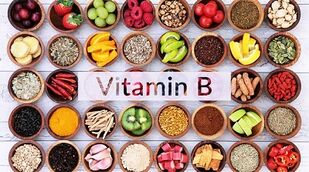
Antioxidants
Billions of living cells in our body are constantly attacked by free radicals - molecules made up of one or more missing electrons. After the loss of elementary particles, the cells are unable to perform their functions.
Ascorbic acid, vitamin E, and beta-carotene (a metabolic precursor of vitamin A) are resistant to free radical damage in brain tissue.
These vitamins improve memory and brain activity.
Vitamin C is also used by the body to produce neurotransmitters and brain cells. The stability and assimilation of Group B substances depends on its level.
Vitamin E is required for Alzheimer's disease, which is characterized by the following symptoms: mood swings, memory impairment, irritability, aggression. It can increase the benefits of the effect of ascorbic acid, prevent its overdose.
Trace elements, amino acids, polyunsaturated fatty acids
Omega-3 fatty acids affect brain activity. Polyunsaturated fats that our bodies cannot synthesize on their own. Consuming foods containing omega-3 can protect the brain from cognitive impairment and improve concentration and memory.
Protein is needed as a building block for the cells in our body and is made up of amino acids.
Most required by the brain:
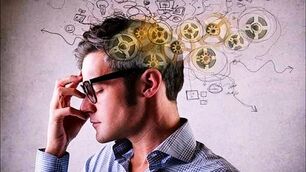
- Glycineis an essential amino acid (ATA), although synthesized by the body, it must be fed. Glycine normalizes the psychological and emotional state, stabilizes brain activity, and to some extent neutralizes the influence of alcohol. This ATK improves sleep, tunes biorhythms. Tyrosine and phenylalaninefight both depression and anxiety. In a healthy body, they eliminate the symptoms of chronic fatigue, improve memory and thought processes, and increase the pain threshold. Phenylalanine is the main building block of phenylethylamine to help you fall in love. And tyrosine is the most potent antidepressant of the amino acids. Thanks to this ATK, not only do the signs of depression disappear, but they also alleviate the symptoms of the premenstrual cycle. These amino acids help overcome caffeine dependence.
- Tryptophan- relieves headaches and irritability in adequate amounts. Tryptophan helps reduce aggression and is used to treat hyperactivity in children. Drugs containing this substance should be used in the complex treatment of schizophrenia and neuroses. He is drunk during therapy for anorexia and bulimia. To some extent, depression resolves after ingestion of this amino acid.
You need to eat enough amino acids with food for normal brain function. The functioning of the central nervous system is not without micronutrients.
Zinc deficiency provokes the development of depression as well as neurological diseases - Alzheimer's and Parkinson's disease. Magnesium improves learning ability and memory. Lack of it can cause headaches, depression and epilepsy. Copper is essential for the brain to control nerve impulses. If this is not enough in the body, neurodegenerative diseases can develop.
Fog and brain dysfunctions are clear signs of iron deficiency.
Which products still contain useful things
It is an indisputable fact that it is natural for a person to get the necessary vitamins from natural food to improve memory and function of the cerebral cortex. Let us examine which of them are best suited for the normal performance of cognitive functions.
Peas are the leader in vitamin B content. It has a positive effect on all brain functions. Peas are followed by oatmeal - an insomnia assistant, a good antidepressant. Then walnuts, paddy rice (in dark husk), vegetables, meat and dairy products.
Eating fatty fish improves brain function. It contains large amounts of omega-3 fatty acids that stimulate memory and improve the perception of information.
The human brain is 60% fat, similar in composition to omega-3, so these acids are used to make nerve cells. If you eat enough of this substance, you can stop mental decline in old age and avoid neurodegenerative diseases. Lack of omega-3 in the body can trigger a state of depression and reduce a person’s ability to work.
Coffee contains caffeine and antioxidants that are beneficial for brain activity. So a cup of aromatic drink not only invigorates in the morning, but also has a good effect on brain activity.
Caffeine allows you to:
- cheer up;
- increases alertness by blocking the synthesis of sleepy adenosine;
- increases concentration.

Despite the controversy surrounding the aromatic drink, the caffeine and antioxidants in coffee are capable of productive work for the brain. Moderate coffee consumption reduces the risk of developing neurodegenerative diseases. But unfortunately, people with high blood pressure are contraindicated to drink this drink.
Blueberries are another useful and unique product that fights the aging of nerve cells and the development of brain diseases. This is due to the high antioxidant content in the berries. These substances help to improve concentration and sometimes also short-term memory loss.
The main ingredient in curry and turmeric gives a special taste not only to the food but also to life. Curcumin promotes blood circulation and memory.
Turmericis very beneficial because:
- stimulates the growth of brain cells;
- fights blue and melancholy: curcumin affects the synthesis of "mood hormones" - serotonin and dopamine;
- stimulates memory, which is especially needed in patients with Alzheimer's disease.
Add turmeric to your tea and curry dishes to get the most out of your curcumin.
A vegetable like broccoli, which most kids don’t like, contains huge amounts of nutrients. One hundred grams of a plant contains more than 100% of the daily value of vitamin K: it is used by the body to create fats that are found in large amounts in brain cells.
Vitamin K maintains alertness, and the antioxidants in broccoli help the body resist brain damage.
Pumpkin seeds are also a powerful antioxidant. They contain many trace elements: zinc, magnesium, copper, iron. In order to improve the quality of mental activity, it is absolutely necessary to include pumpkin seeds in the diet.
It’s good to eat a bar of dark chocolate or drink cocoa. These foods are rich in flavonoids, antioxidants and caffeine, which can improve mood and slow brain aging.
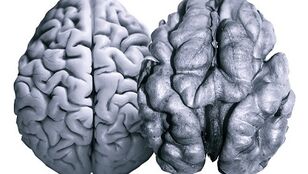
Walnuts complete the list of brain-friendly foods. In addition to B vitamins, it is rich in: omega-3 fatty acids, antioxidants, vitamin E. Could the external similarity between nuts and the human brain not be accidental?
In the diet, one orange a day provides the body with the daily need for vitamin C and also prevents the brain from aging, protecting it from free radicals. Vitamin C is abundant in tomatoes, kiwi, guava, peppers and strawberries.
Eggs are an excellent source of vitamins, folate and choline. They prevent brain aging and melancholy.
Although the effects of eggs on the body are not yet fully understood, the benefits of eating have long been known.
Green tea also improves brain function. It is high in caffeine and L-theanine, which can help reduce anxiety, reduce fatigue and relax. Among other things, green tea helps improve memory.
In conclusion, a comprehensive, balanced diet is a relatively inexpensive and effective way to improve human brain activity and memory.
It is best to eat fresh, organic food and adhere to your daily fluid intake.
Our diet directly affects the stable functioning of the brain. To maintain your activity, you need to practice and train your cognitive skills regularly in addition to nutrition.
Drugs from the pharmacy
In the modern world, it is very difficult to supply yourself with natural vitamins. Most food nutrients are lost during food processing (sterilization, preservation, exposure to high and low temperatures). The way out of this situation is to compensate for the missing elements with synthesized analogues of the pharmaceutical industry.
Vitamins needed for memory and brain function for adults and children can be purchased at any pharmacy. Devices in which a tablet contains the full vitamin complex needed by the brain are very popular. They are often combined with trace elements. They also take a partial comprehensive approach that includes vitamins from a group such as Group B.
Formulations containing an active substance (folic acid, vitamin C) are also produced. Their benefits include low cost, overdose, and less likelihood of allergic reactions.
There are medications that contain vitamins enriched with nootropic supplements to improve memory and concentration.
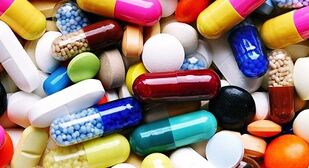
Brain-stimulating amino acids and omega-3 acids stand out separately.
Drugs that improve brain activity have a beneficial effect on the thought process itself, sharpening concentration and improving memory. Such vitamins make a person calm and balanced. Older people need to take dietary supplements and vitamins as they tone the brain tissue, helping to restore vascular flexibility.
Do not expect a quick effect from taking vitamins. The changes will be seen with regular medication.
Age-related cognitive decline awaits everyone who has lived long enough. But timely preventive measures will allow normal brain activity to be maintained in the future.
You need to eat a balanced diet, trying to eat more natural foods that contain antioxidants and vitamins for mental activity. In times of high mental stress, seasonal lack of fresh fruits and vegetables, it is desirable to replace vitamin deficiency with synthesized drugs in old age.








































































